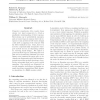Free Online Productivity Tools
i2Speak
i2Symbol
i2OCR
iTex2Img
iWeb2Print
iWeb2Shot
i2Type
iPdf2Split
iPdf2Merge
i2Bopomofo
i2Arabic
i2Style
i2Image
i2PDF
iLatex2Rtf
Sci2ools
117
click to vote
ICML
2004
IEEE
2004
IEEE
Parameter space exploration with Gaussian process trees
Computer experiments often require dense sweeps over input parameters to obtain a qualitative understanding of their response. Such sweeps can be prohibitively expensive, and are unnecessary in regions where the response is easy predicted; well-chosen designs could allow a mapping of the response with far fewer simulation runs. Thus, there is a need for computationally inexpensive surrogate models and an accompanying method for selecting small designs. We explore a general methodology for addressing this need that uses non-stationary Gaussian processes. Binary trees partition the input space to facilitate non-stationarity and a Bayesian interpretation provides an explicit measure of predictive uncertainty that can be used to guide sampling. Our methods are illustrated on several examples, including a motivating example involving computational fluid dynamics simulation of a NASA reentry vehicle.
Fewer Simulation Runs | Fluid Dynamics Simulation | ICML 2004 | Machine Learning | Non-stationary Gaussian Processes |
Related Content
| Added | 17 Nov 2009 |
| Updated | 17 Nov 2009 |
| Type | Conference |
| Year | 2004 |
| Where | ICML |
| Authors | Robert B. Gramacy, Herbert K. H. Lee, William G. Macready |
Comments (0)

